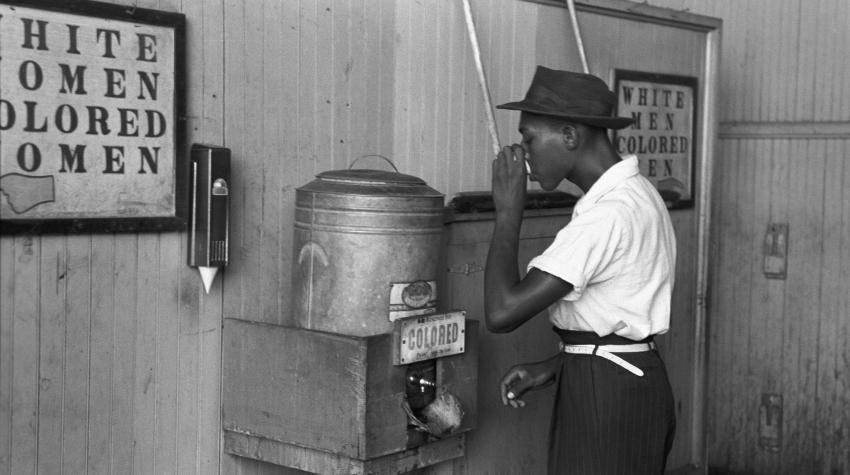
The Solidarity of Peoples
No. 3 Vol. XLIV 2007Racism and racial discrimination are a clear affront to the fundamental truth that"all human beings are born free and equal in dignity and rights". Yet, six decades after the adoption of the Universal Declaration of Human Rights (1948) and four decades after the entry into force of the International Convention on the Elimination of All Forms of Racial Discrimination (1969), the principles of equality and non-discrimination are still far from a universal reality.
Equal Opportunity In Education : Eliminating Discrimination Against Roma
n 2002, on my way to the United States Congress where a hearing on the education of Roma was being held, I was asked by the taxi driver where I come from and what was the purpose of my trip. I told him I was going to testify before the Congress about the problems faced by Roma in education.
Racial Discrimination and the Legal System: The Recent Lessons of Louisiana
Racial discrimination is widespread in the legal system of the United States. A recent example from Louisiana will help underscore the statistics that follow.
The Struggle against Apartheid: Lessons for Today's World
The United Nations has been concerned with the issue of racial discrimination since its inception. The UN General Assembly adopted on 19 November 1946 during its first session a resolution declaring that it is in the higher interests of humanity to put an immediate end to religious and so-called racial persecution and discrimination, and calling on Governments and responsible authorities to conform both to the letter and to the spirit of the Charter of the United Nations, and to take the most prompt and energetic steps to that end.
Discrimination Against Indigenous Peoples: The Latin American Context
In discussing the issue of discrimination against indigenous peoples, it is tempting to paraphrase a preambular paragraph of the Convention on the Prevention and Punishment of the Crime of Genocide and say that at all periods of history, discrimination, in its many forms, has inflicted great losses on humanity.
Racism in Football – Football against Racism: The FARE Experience
Anti-racism campaigners have been busy over the last couple of months. Concerns over racism, xenophobia and far-right activity in and around football stadiums have reached fever pitch. Even though the new football season, 2007-2008, has barely started in Europe, we have already witnessed a progression of serious incidences.
Asylum Today: Tougher Policies, Tumbling Numbers, Intolerance in Between
Industrialized countries in recent years have complained about being swamped by asylum-seekers and have adopted increasingly stricter policies designed to stem the tide of refugees and ensure border protection.
Confronting The Legacy Of Slavery And The Slave Trade: Brown University Investigates Its Painful Past
In April I had the privilege of participating in a scholarly panel at the United Nations, one in a series of events sponsored by the CARICOM Secretariat to commemorate the 200th anniversary of the abolition of the transatlantic slave trade by the legislatures of the United States and Great Britain.
Race and Poverty in Latin America: Addressing the Development Needs of African Descendants
Latin America has made solid economic strides over the past two decades in terms of sustained economic growth, increasing average income levels and decreasing average infant mortality rates.
State-led Efforts in Eliminating Racial Discrimination: The Experience in Spain
There is no denying the existence of racism in Europe. We pride ourselves on having advanced democratic systems, a legal framework that protects and guarantees the rights of the individual and a welfare State that supplies basic services to all citizens, equally.
The New Untouchables Crime: Punishment and Race in America
The current American prison system is a leviathan unmatched in human history. Never before has a supposedly free country denied basic liberty to so many of its citizens. In December 2006, some 2.25 million people were being held in the nearly 5,000 prisons and jails scattered across America's urban and rural landscapes.
Looking Forward To The Future: Europe's Societies Are Undergoing Change
At the end of my nine years as Director of the European Monitoring Centre on Racism and Xenophobia -- now the European Union Agency for Fundamental Rights -- I would like to share my experience in addressing racial discrimination.
Racial Discrimination and Miscegenation: The Experience in Brazil
In 1888, Brazil, with a mostly black and mixed race or mulatto population, was the last country in the Western Hemisphere to abolish slavery. During more than 300 years of slavery in the Americas, it was the largest importer of African slaves, bringing in seven times as many African slaves to the country, compared to the United States.
Eliminating Racial Discrimination: The Challenges of Prevention and Enforcement of Prohibition
States Parties undertake to prohibit and to eliminate racial discrimination in all its forms and to guarantee the right of everyone, without distinction as to race, colour or national or ethnic origin, to equality before the law, according to the 1965 International Convention on the Elimination of All Forms of Racial Discrimination, notably in the enjoyment of political, civil, economic, social and cultural rights.
Bridging The Racial Divide: Model United Nations South Africa
One of the most enduring legacies of apartheid is that an entire generation of black South Africans was deprived of a decent education by a system designed to entrench racial oppression and subjugation.
Looking Beyond Durban: The Significance of Racial Discrimination on the International Human Rights Agenda
Resistance to discrimination goes back to the origin of the human rights concept. It was the rejection of differentiation of people on the basis of national, ethnic or social origin, religion and gender, as well as resistance against slavery, that marked the history of human rights.
In the Wake of Xenophobia: The New Racism in Europe
Europe was torn apart by fascism in the 1930s, and when the Second World War ended in 1945, remnants of extreme right parties re-emerged on the margins of politics. By the 1980s, when the forgetting had started, some began to pick up protest votes as immigrants became an issue, driven by tabloid journalists looking for a cheap story.
Double Standards of Justice: The Case of Gernarlow Wilson
Four years ago, in Douglasville, Georgia, a 17-year-old high school senior made a fateful mistake, one that would cost a surprising price. During a New Year's Eve celebration, Gernarlow Wilson participated in consensual sexual act with a 15-year-old girl.
Poverty And Human Rights: Reflections On Racism and Discrimination
Currently, in both the international system and the inter-American system for the protection of human rights, there are instruments which emphasize the obligation of States to guarantee the observance of the rights of all human beings, without distinction as to race, gender, religion or political stance.
Discrimination of Aboriginals on Native Lands in Canada
With inflated proportions of their neighbours in prison, on parole or at risk, the world's native communities have another urgent problem to contend with. Statistics show that the percentage of indigenous people in conflict with the justice system is extreme and in many places those numbers may be on the rise.
The Long Road to Durban: The United Nations Role in Fighting Racism and Racial Discrimination
From its inception in 1945, the United Nations has led an unrelenting fight against racism and racial discrimination. The framework for the Organization's work in that area was the declaration in the preamble to its Charter on the question of human rights: We the peoples of the United Nations determined . to reaffirm faith in fundamental human rights, in the dignity and worth of the human person, in the equal rights of men and women and of nations large and small, and . to practice tolerance and live together in peace with one another as good neighbours.
Between Past Failure and Future Promise: Racial Discrimination and the Education System
The focus of this article is to examine the theme of racial discrimination within the context of education policymaking. It will draw on an ongoing conceptual debate that analyses contemporary education and social policy evidence within an integrationist/multicultural framework, but also analyse the extreme concepts of assimilation and anti-racist education policy.
The Decade of Roma Inclusion: Addressing Racial Discrimination Through Development
The Decade of Roma Inclusion is an unprecedented pan-European initiative that channels the efforts of Governments, as well as inter-governmental and non-governmental organizations, to eradicate racial discrimination and bring about tangible improvement to the plight of the world's most populous marginalized community.

The Ideology of Racism: Misusing Science to Justify Racial Discrimination
In his exceptionally insightful book, Racism: A Short History, Stanford University historian George M. Fredrickson notes the paradox that notions of human equality were the necessary precondition to the emergence of racism.
A New Way of Dealing With the Past: The Young Generation in Germany Sheds Its Anxiety of Xenophobia
Students in present-day Germany learn early on: there is no denying their past. History teachers tell them that what their grandparents might have been a part of during the Second World War does not apply to them directly.
The Trans-Atlantic Slave Trade And Slavery: The Psychic Inheritance
The Caribbean is arguably the living laboratory of the dynamism of the encounters between Africa and Europe on foreign soil, and both with the Native American who had inhabited the real estate of the Americas during periods of conquest and dehumanization and the corresponding process of struggle and resistance.

Combating Racism and Racial Discrimination in Europe
In today's world, contemporary forms of racism and racial discrimination are complex and disturbing. In Europe, these issues increasingly lie at the heart of political and social concerns. Faced with persistent expressions of racism and xenophobia, the Council of Europe Member States have, for several years now, been taking firm and sustained action to combat these trends.
